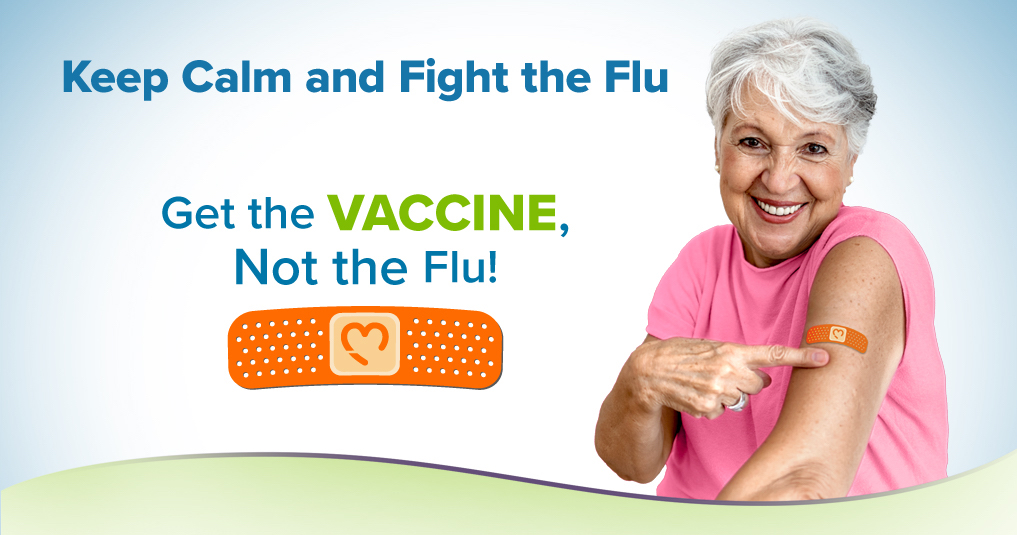 Blog
Blog Read time: 4 min.
You’re not feeling well; your whole body hurts, you’re tired, and you have a 101-degree temperature. Anyone who has ever felt this way knows exactly what this is. You have the flu.
But you don’t have to take it lying down. The best way to prevent the flu, especially during peak season between October and May, is by getting the influenza vaccine. CDC recommendation is for everyone 6 months and older, including pregnant women and adults 65 years and above, to get a flu vaccine every year. The flu doesn’t discriminate; it’s no fun for anyone.
Here are 10 reasons why it’s time to roll up your sleeves and get vaccinated:
1. Flu viruses are constantly changing.
Flu vaccines may be updated from one year to the next. This is to protect against the viruses research suggests will be common during the upcoming flu season.
2. Your protection from a flu vaccine declines over time.
Without good protection against the flu, COVID-19, and RSV (Respiratory Syncytial Virus), you run the risk of being infected with all three viruses. These infections can weaken your immune system, making you vulnerable to the severe complications the viruses can produce, including death.
3. The flu is different from the common cold.
While they are both viral infections, the flu is caused by the influenza virus, and the common cold is usually caused by rhinovirus and adenovirus. The flu is a more serious disease that can have severe complications. The common cold is a milder upper respiratory disease.
| Common Cold Symptoms | Common Flu Symptoms |
| Stuffy nose | Fever of 100 degrees and above |
| Sneezing | Headaches |
| Sore throat | Severe aches and pains |
| Mild to moderate coughing | Fatigue and weakness lasting up to 2-3 weeks |
| Extreme exhaustion | |
| Coughing, which can be severe |
4. The flu is highly contagious.
The flu is a highly contagious, debilitating disease that can lead to complications, hospitalizations, and even death.
If you become infected with the flu virus, you may not be aware at first. It may take 2-3 days, or up to 1 week, for symptoms to show.
Please note: during this time without symptoms, you are contagious and can still infect others.
5. Symptoms are severe and can even be dangerous.
The start of flu symptoms can leave a lasting impression.
It happens suddenly, with a high fever, shaking chills, fatigue, and intense muscle and joint pain so severe you can’t get out of bed. Some patients also experience nausea, vomiting, abdominal pain, and diarrhea. Symptoms may last anywhere between 4 to 7 days.
It is possible to develop pneumonia, which may lead to hospitalization and require the patient to be put on a breathing machine. The flu virus may even affect the kidneys, leading to dialysis and death.
6. The shot is the best way to avoid the flu.
The best way to avoid the flu is to get the flu vaccine at the beginning of each flu season, which begins in October and ends in May. In addition to the vaccine, there are ways you can protect yourself:
7. The vaccine doesn’t cause the flu.
The flu vaccine does not contain a live influenza virus. It contains an inactive form of the virus, which cannot infect you.
8. You may feel unwell after the flu shot, but it’s still better than getting the
There could be two reasons for getting sick after receiving the flu vaccine:
9. Children under 5 and adults over the age of 65 are more at risk of complications.
Anyone who develops the flu is at risk of developing complications from the disease. However, those more at risk are:
10. Even those allergic to eggs can get the flu vaccine.
Having an egg allergy should not stop you from getting vaccinated. There are only three reasons to avoid the flu vaccine:
Many places offer the flu vaccine for free or low cost, especially in the fall, the ideal time to get vaccinated.
Check with your doctor, pharmacist, or local or state health department to find local resources. Then, get the vaccination. It’s the smart thing to do.